RA Ibiza weekly: IMS, Nile Rodgers, openings
- PublishedFri, May 30, 2014, 12:00
- Words
- Share
- Our dedicated Ibiza column returns for 2014, kicking off the season with a look at IMS and the first round of opening parties.
- RA's Ibiza weekly column is back. Over the next four months you can expect a blend of news, reviews and behind-the-scenes content direct from the White Isle. In addition, you can find comprehensive Ibiza listings and information over at our dedicated micro-site. But for now, RA's Carlos Hawthorn takes stock of the first weekend of the 2014 season.
IMS According to Nile Rodgers, Ibiza's International Music Summit currently marks "the official beginning of summer." His is a view shared across the island, as the penultimate week of May calls time on months of barren beaches, peaceful streets and quiet nights-in. It's as if someone flicked a switch, so dramatic is the shift. Heightening the sense of shock at this year's IMS was the move to a brand new venue: the opulent Hard Rock Hotel. Situated in Playa d'en Bossa, a stone's throw from the Ushuaia Tower, the three-day old edifice loomed large over the surrounding area. Making my way through the hotel lobby, the place overrun with industry professionals, coffee cups and suitcases, the full force of the impending Ibiza season hit home.
 Despite an initial air of frenzy, the Hard Rock Hotel looked and felt the part. Its various ground-floor bars and hang-out spots easily catered to IMS's swollen populace, giving the conference a relaxed, sprawling feel. The schedule, too, seemed more comprehensive, with a myriad of eye-catching interviews, talks and panels touching upon every corner of the international scene.
Day one got off to a youthful start, with Blaise Belleville (Boiler Room) and Jamal Edwards (SB.TV) offering their respective insights into how best to package and drive the consumption of dance music in the digital age. Whether you're filming MCs on street corners, or up-and-coming DJs in abandoned basements, the message is the same: give local talent a global platform. As the impressive facts and figures flowed, the largely middle-aged audience looked on in admiration.
It was on day two, however, that IMS really sprang into life. At the heart of it all was Seth Troxler, whose controversial article ("Dance Festivals Are The Best And Worst Places In The World") appeared on Thump the day before the conference. The timing was impeccable. Sitting centrestage on the first panel of the day ("The Natural Selection Of Nightlife In Ibiza"), Troxler ended the discussion with an inversion of the norm, asking two members of the audience a question. The chosen pair, Cocoon's Johannes Goller and Desolat's Tom Pruess, offered their contrasting opinions on last year's rampant DJ-swap phenomenon, and why 2014 will see a return to a more traditional approach. It made for exciting listening. The buzz around Troxler was starting to build.
Despite an initial air of frenzy, the Hard Rock Hotel looked and felt the part. Its various ground-floor bars and hang-out spots easily catered to IMS's swollen populace, giving the conference a relaxed, sprawling feel. The schedule, too, seemed more comprehensive, with a myriad of eye-catching interviews, talks and panels touching upon every corner of the international scene.
Day one got off to a youthful start, with Blaise Belleville (Boiler Room) and Jamal Edwards (SB.TV) offering their respective insights into how best to package and drive the consumption of dance music in the digital age. Whether you're filming MCs on street corners, or up-and-coming DJs in abandoned basements, the message is the same: give local talent a global platform. As the impressive facts and figures flowed, the largely middle-aged audience looked on in admiration.
It was on day two, however, that IMS really sprang into life. At the heart of it all was Seth Troxler, whose controversial article ("Dance Festivals Are The Best And Worst Places In The World") appeared on Thump the day before the conference. The timing was impeccable. Sitting centrestage on the first panel of the day ("The Natural Selection Of Nightlife In Ibiza"), Troxler ended the discussion with an inversion of the norm, asking two members of the audience a question. The chosen pair, Cocoon's Johannes Goller and Desolat's Tom Pruess, offered their contrasting opinions on last year's rampant DJ-swap phenomenon, and why 2014 will see a return to a more traditional approach. It made for exciting listening. The buzz around Troxler was starting to build.
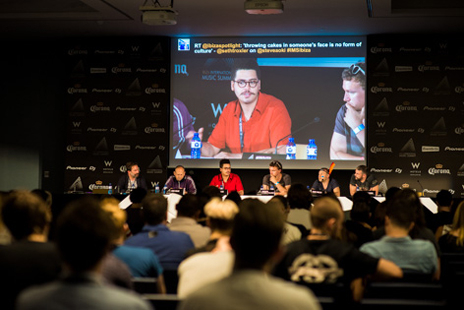 Next up, Pete Tong sat down with the US DJ for his keynote interview. Rather than dig deep into Troxler's past, the radio veteran thought it more valuable to frame the conversation around the Thump piece. As someone who has made a career out of straddling the underground and commercial scenes, Tong challenged Troxler's motives, questioning the need to forge a divide between the two worlds. Troxler responded maturely, agreeing it wasn't so much the music as "the way these acts are presented that I have a problem with." It made for an engaging back and forth, and one that felt markedly personal. At an event which prides itself on representing dance music in all its guises, one could feel the tension in the air.
The rest of the day, though, remained both captivating and conflict-free. Interviews with Timewarp's Steffen Charles, former U2 manager Paul Mcguinness and Alfredo, the godfather of Ibiza clubbing, showcased the kind of variety and curiosity about other sounds and scenes that has transformed IMS into such a powerful platform. A soft-spoken Alfredo, with his candid take on the negative impact British holidaymakers had on the island's party scene in the early '90s, presented a particularly fascinating talk. It's just a shame the conference room wasn't more full.
Next up, Pete Tong sat down with the US DJ for his keynote interview. Rather than dig deep into Troxler's past, the radio veteran thought it more valuable to frame the conversation around the Thump piece. As someone who has made a career out of straddling the underground and commercial scenes, Tong challenged Troxler's motives, questioning the need to forge a divide between the two worlds. Troxler responded maturely, agreeing it wasn't so much the music as "the way these acts are presented that I have a problem with." It made for an engaging back and forth, and one that felt markedly personal. At an event which prides itself on representing dance music in all its guises, one could feel the tension in the air.
The rest of the day, though, remained both captivating and conflict-free. Interviews with Timewarp's Steffen Charles, former U2 manager Paul Mcguinness and Alfredo, the godfather of Ibiza clubbing, showcased the kind of variety and curiosity about other sounds and scenes that has transformed IMS into such a powerful platform. A soft-spoken Alfredo, with his candid take on the negative impact British holidaymakers had on the island's party scene in the early '90s, presented a particularly fascinating talk. It's just a shame the conference room wasn't more full.
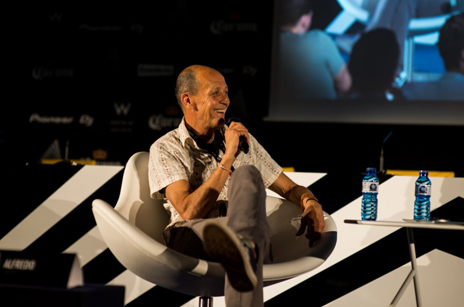 On paper, the third and final day of IMS was all about one man: George Clinton. The funk hero, however, would speak to close out the conference, allowing plenty of time for more drama to unfold in the meantime. Following a passionate panel on the burgeoning (and very Barcelona-centric) "Spanish Underground Movement," three representatives from Team Avicii drily discussed the finer details of their client's ascent to superstardom. Behind them, tweets appeared on a screen, informing the room that Seth Troxler was present. What followed was a ballsy, if anti-climactic, exchange. Troxler nervously fired off three questions, challenging both the credibility of Avicii's production credits and his music. Avicii's manager Ash Pournouri, perhaps unaware it was Troxler, responded calmly, assuring the audience that "Tim is the main guy" and that "we do something we believe in—we're not concerned with the contribution we're making." Perhaps not the fireworks many had hoped for, but a moment nonetheless.
On paper, the third and final day of IMS was all about one man: George Clinton. The funk hero, however, would speak to close out the conference, allowing plenty of time for more drama to unfold in the meantime. Following a passionate panel on the burgeoning (and very Barcelona-centric) "Spanish Underground Movement," three representatives from Team Avicii drily discussed the finer details of their client's ascent to superstardom. Behind them, tweets appeared on a screen, informing the room that Seth Troxler was present. What followed was a ballsy, if anti-climactic, exchange. Troxler nervously fired off three questions, challenging both the credibility of Avicii's production credits and his music. Avicii's manager Ash Pournouri, perhaps unaware it was Troxler, responded calmly, assuring the audience that "Tim is the main guy" and that "we do something we believe in—we're not concerned with the contribution we're making." Perhaps not the fireworks many had hoped for, but a moment nonetheless.
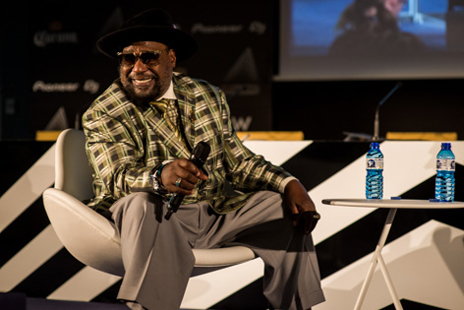
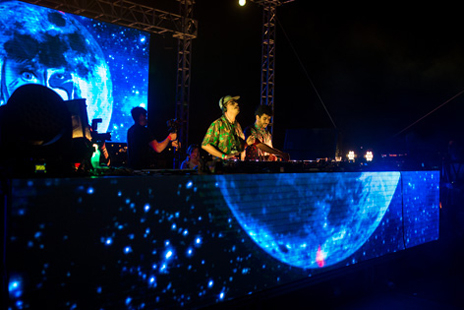 With three days of talks weighing heavily on people's shoulders, there was just enough time for Clinton's jovial climax. Dressed in a flamboyant, regal suit, the Parliament Funkadelic star led journalist Craig McLean through more than four decades of acid trips, a-list collaborations and uncleared samples. In a similar way to Nile Rodgers last year, one came away in awe of Clinton's insatiable thirst for making and performing music. Unfortunately, IMS couldn't convince him to join Bob Moses, Eats Everything, Jamie Jones and Seth Troxler up at Dalt Vila for the Grand Finale. Predictably, the latter stole the show. Not only was his back-to-back set with Jones the pick of the bunch, but joining him on stage were a group of exuberant 13-year-olds. "I was standing in KFC before the show and one of them asked me if I could get them into Dalt Vila," Troxler told me later that night. "It turned out he was a son of a friend of mine and hey, if you don't ask, you don't get."
Interview: Nile Rodgers
With three days of talks weighing heavily on people's shoulders, there was just enough time for Clinton's jovial climax. Dressed in a flamboyant, regal suit, the Parliament Funkadelic star led journalist Craig McLean through more than four decades of acid trips, a-list collaborations and uncleared samples. In a similar way to Nile Rodgers last year, one came away in awe of Clinton's insatiable thirst for making and performing music. Unfortunately, IMS couldn't convince him to join Bob Moses, Eats Everything, Jamie Jones and Seth Troxler up at Dalt Vila for the Grand Finale. Predictably, the latter stole the show. Not only was his back-to-back set with Jones the pick of the bunch, but joining him on stage were a group of exuberant 13-year-olds. "I was standing in KFC before the show and one of them asked me if I could get them into Dalt Vila," Troxler told me later that night. "It turned out he was a son of a friend of mine and hey, if you don't ask, you don't get."
Interview: Nile Rodgers
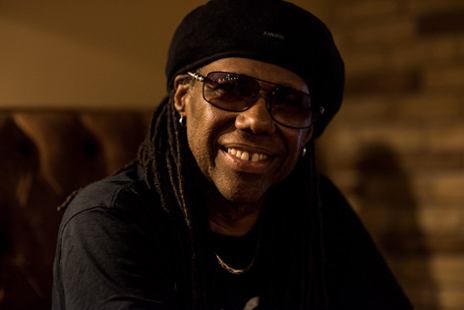 Nile Rodgers, frontman for the disco outfit Chic, was making dance music before the term was even in use. Counting Madonna, David Bowie and Daft Punk among his recording credits, he is responsible for some of the biggest, most danceable songs in existence. Clocking up his third successive appearance at IMS, Rodgers sat down with us poolside at The Hard Rock Hotel as he prepared to receive the conference's annual Legend award.
So this is your third year at IMS? You guys have developed quite a relationship.
Yeah I have become an IMS institution.
So how does it feel to be back?
It's great, really great. And what's interesting is that something good always comes of it. The first year I had just finished working on Random Access Memories and of course with Daft Punk they like to keep their information silent and I let it slip a little bit but I didn't say too much cause I caught myself. And then last year when I was here the record had just been released and it was the talk of the conference. And the first year I met Nicky Romero and David Guetta and Carl Cox and then last year I spent time... oh and Avicii. And in the last year I've spent time making records with all of them.
So what is it about IMS that makes you think it's worthwhile from an industry perspective?
Well I can only speak from my own point of view because I think different people take different things from the experience. From my point of view it showed me that dance music was relevant to that audience that doesn't live inside my head.
I write dance music. But the interesting thing is I write all types of dance music and have never been restricted by any label or sound or whatever. I do understand the need to identify things by genres, but I just like the overall label of dance music because that's what it is, music that makes you dance. It is weird though, this dance music term. It's like if someone makes a record that makes you dance, but is from a different style or a different genre of music, it takes someone remixing it for it to become proper dance music. Which is weird for me, because I got started in dance music because it was the one style or sound that allowed people to come together regardless of their background. I started in the seventies, and if you looked at the dance charts in the seventies you could see everyone from the Rolling Stones to Rod Stewart, as well as all these one-hit wonders that you will never hear from again. Those one-hit wonders man, no one could compete with those records and you couldn't wait for it to die out because it was just devastating, dominating the atmosphere.
A bit like "Get Lucky."
[Laughs] Yeah. So that's the vibe I come from and that's still my outlook on dance music. I still think that it's the most powerful form of music even though if you look at the charts and take note of the best selling records of all time it's typically white male-driven rock. You know, The Beatles, Led Zeppelin. But within those lists there are so many other types of music that may not fit that modern classification of dance music, but still all seem to feature dancing as a major component.
Take country music, for example. Sure, the biggest country songs are mostly ballads that people don't dance to but a lot of it is actually very closely related to the style of dance that we did in the seventies. You know you're touching the girl and you got all these moves that you gotta stand in the mirror and practice before you even approach the girl. As a black person that's the world I come from. The world that you have to study the dance; you gotta know the moves. Every dance has got a name, every move has got a name. In the hippie scene I grew up in we used to do this thing called helicopter dancing where just one person would be high on acid and just start turning in circles by themselves. That was interesting but that was still a direct offshoot of the dance craze that happened in the sixties called the twist and the twist was dancing where you did not touch the other person. So hippie dancing you didn't touch the other person. The twist you didn't touch the other person. The seventies came in and they started touching. So country kept the seventies vibe, they kept the touching. These people were the most anti-disco in weird way but it's all totally related.
Nile Rodgers, frontman for the disco outfit Chic, was making dance music before the term was even in use. Counting Madonna, David Bowie and Daft Punk among his recording credits, he is responsible for some of the biggest, most danceable songs in existence. Clocking up his third successive appearance at IMS, Rodgers sat down with us poolside at The Hard Rock Hotel as he prepared to receive the conference's annual Legend award.
So this is your third year at IMS? You guys have developed quite a relationship.
Yeah I have become an IMS institution.
So how does it feel to be back?
It's great, really great. And what's interesting is that something good always comes of it. The first year I had just finished working on Random Access Memories and of course with Daft Punk they like to keep their information silent and I let it slip a little bit but I didn't say too much cause I caught myself. And then last year when I was here the record had just been released and it was the talk of the conference. And the first year I met Nicky Romero and David Guetta and Carl Cox and then last year I spent time... oh and Avicii. And in the last year I've spent time making records with all of them.
So what is it about IMS that makes you think it's worthwhile from an industry perspective?
Well I can only speak from my own point of view because I think different people take different things from the experience. From my point of view it showed me that dance music was relevant to that audience that doesn't live inside my head.
I write dance music. But the interesting thing is I write all types of dance music and have never been restricted by any label or sound or whatever. I do understand the need to identify things by genres, but I just like the overall label of dance music because that's what it is, music that makes you dance. It is weird though, this dance music term. It's like if someone makes a record that makes you dance, but is from a different style or a different genre of music, it takes someone remixing it for it to become proper dance music. Which is weird for me, because I got started in dance music because it was the one style or sound that allowed people to come together regardless of their background. I started in the seventies, and if you looked at the dance charts in the seventies you could see everyone from the Rolling Stones to Rod Stewart, as well as all these one-hit wonders that you will never hear from again. Those one-hit wonders man, no one could compete with those records and you couldn't wait for it to die out because it was just devastating, dominating the atmosphere.
A bit like "Get Lucky."
[Laughs] Yeah. So that's the vibe I come from and that's still my outlook on dance music. I still think that it's the most powerful form of music even though if you look at the charts and take note of the best selling records of all time it's typically white male-driven rock. You know, The Beatles, Led Zeppelin. But within those lists there are so many other types of music that may not fit that modern classification of dance music, but still all seem to feature dancing as a major component.
Take country music, for example. Sure, the biggest country songs are mostly ballads that people don't dance to but a lot of it is actually very closely related to the style of dance that we did in the seventies. You know you're touching the girl and you got all these moves that you gotta stand in the mirror and practice before you even approach the girl. As a black person that's the world I come from. The world that you have to study the dance; you gotta know the moves. Every dance has got a name, every move has got a name. In the hippie scene I grew up in we used to do this thing called helicopter dancing where just one person would be high on acid and just start turning in circles by themselves. That was interesting but that was still a direct offshoot of the dance craze that happened in the sixties called the twist and the twist was dancing where you did not touch the other person. So hippie dancing you didn't touch the other person. The twist you didn't touch the other person. The seventies came in and they started touching. So country kept the seventies vibe, they kept the touching. These people were the most anti-disco in weird way but it's all totally related.
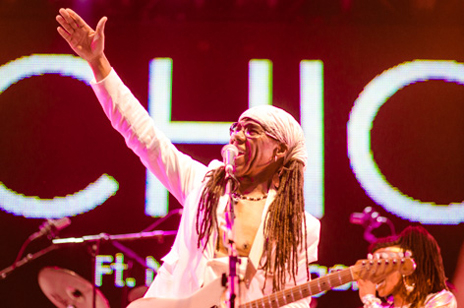 Tonight you've been presented with a legend award at IMS. Do you feel like a legend?
No. It's actually cracking me up. Not only is the legend thing cracking me up, but the billboards everywhere are killing me. It's like, you know when I first came to Ibiza three years ago and I saw David Guetta and Carl Cox up on the side of the road, I was like "What's this? Atlantic City, Vegas?" And now I'm up there! So yesterday I couldn't help it, I stood in front of one and I took a selfie with me and the thing in the background cause it just looks so stupid I was crying. But, you know, it's just because of the way that I always thought of my band and myself as an artist. I knew that I didn't have the stuff that stars were made of because I played behind stars all my life. And that's my gig, I play behind stars. I play behind Bowie, I play behind Madonna, that's what I do. When Bowie walks into a room its all starry, he's got that floating on air thing.
I don't have that. I knew I never had that, so when we created Chic the genius—and I have now to admit that it was genius—was we knew what we weren't. We were not stars. So we said we've got to create this made-up concept where the music is the star. In those days music could be the star because remember we'd come from the era of the one-hit wonders. So we knew we could be one-hit wonders but we wanted to be one-hit wonders like thirty times [Laughs]. I was like, are we smart enough to write novelty records? Most one-hit wonders are novelty records and novelty records are so good but you can't compete with them and you can't repeat it. People get furious with me when I tell them that Chic songs are novelty records. And they go "no man Chic is great man, you're a great guy" and I go: "That doesn't take away from us being great musicians!"
Take "Le Freak (Freak Out)," for example. At the start of the record you can hear Bernard go "1,2", to count the record in. In the old days you would cut the count, but we left it on intentionally because we had to think of ways to make radio DJs play the record. And when they heard that that they'd go: "Hey there's something wrong with this, play it again." Boom we got them. Play it again. Bingo. "Hey there's something wrong with this record, play it again!" "Wow, I love that song, I can't get it out of my head." We had to be clever.
And if you had to give someone in music a legend award, who would you give it to?
There's a million people that I can think of, but the first person that came to my mind was Prince. Prince is a legend. I did an interview with him a couple of weeks ago and I said when Bernard and I went to see you play live it felt like it was a seismic shift in music.
Wow.
It really felt like that. We went to see him and just stood there staring. When the show started and Prince walked on stage, they all started with their backs to the audience, with Prince in the middle. I thought it was a girl! I was like "wow, look at her, how hot she is. Man look at that ass on her, it's like incredible." He was wearing those skin tight pants with plateau shoes. When he turned around I was like "oh my god that's Prince!" It was smoking. I had never heard a band play that tight and that funky, except for Chic. Actually we're going on tour together later this year. Our first show will be in Superdome in New Orleans like 70,000 people or something.
I bet. Tell me about this track you've made that's out on CR2 Records.
So last year they asked me to write the 2013 official IMS anthem. And for me anthem means something quite specific. For me, an anthem, it's the opening ceremony, it's something similar to a fanfare or a piece of music that represents a situation. A specific situation. So that's what was supposed to happen. I was writing a piece of music for a specific situation and as soon as that specific situation was over that piece of music was over. I thought about the conference, and the one thing I went away with was something that I've always believed in: that dance music and club culture created this atmosphere where you just felt you could do what you wanna do. It was a free culture you know, fuck society, we are here for the music, that's our excuse. And we gonna do what we wanna do. So that's what I named the song, "Do What You Wanna Do."
Openings
Last Wednesday, it was left to Sankeys and new night Tribal Sessions to cut the ribbon for Ibiza's 2014 season. Forming part of IMS's nocturnal programme, the official opening slot is a baptism of fire, with a club packed full of baying punters all but guaranteed. It's an earner, but get it wrong and you'll quickly realise the value of first impressions. Thankfully for Tribal Sessions, they made it through their island inauguration without a hitch. The venue itself remains mostly unchanged from last year, save for the removal of the redundant VIP area in the far left corner of The Basement.
Taking the downstairs crowd through to peak-time was Recondite, a welcome if slightly odd act with which to kickstart the summer. Known for his broody, melodic techno, the German producer showed he's completely comfortable working the dance floor. Blending tracks from Hinterland with newer cuts, his one-hour live set was well received. Upstairs, Danny Tenaglia was finding his groove in The Lab's new raised DJ booth. Throwing down the kind of meaty tribal house with which he made his name, the New York veteran had the room ducking and diving to his every move. Full without being uncomfortable, there was an undeniable buzz about the Sankeys opening.
Tonight you've been presented with a legend award at IMS. Do you feel like a legend?
No. It's actually cracking me up. Not only is the legend thing cracking me up, but the billboards everywhere are killing me. It's like, you know when I first came to Ibiza three years ago and I saw David Guetta and Carl Cox up on the side of the road, I was like "What's this? Atlantic City, Vegas?" And now I'm up there! So yesterday I couldn't help it, I stood in front of one and I took a selfie with me and the thing in the background cause it just looks so stupid I was crying. But, you know, it's just because of the way that I always thought of my band and myself as an artist. I knew that I didn't have the stuff that stars were made of because I played behind stars all my life. And that's my gig, I play behind stars. I play behind Bowie, I play behind Madonna, that's what I do. When Bowie walks into a room its all starry, he's got that floating on air thing.
I don't have that. I knew I never had that, so when we created Chic the genius—and I have now to admit that it was genius—was we knew what we weren't. We were not stars. So we said we've got to create this made-up concept where the music is the star. In those days music could be the star because remember we'd come from the era of the one-hit wonders. So we knew we could be one-hit wonders but we wanted to be one-hit wonders like thirty times [Laughs]. I was like, are we smart enough to write novelty records? Most one-hit wonders are novelty records and novelty records are so good but you can't compete with them and you can't repeat it. People get furious with me when I tell them that Chic songs are novelty records. And they go "no man Chic is great man, you're a great guy" and I go: "That doesn't take away from us being great musicians!"
Take "Le Freak (Freak Out)," for example. At the start of the record you can hear Bernard go "1,2", to count the record in. In the old days you would cut the count, but we left it on intentionally because we had to think of ways to make radio DJs play the record. And when they heard that that they'd go: "Hey there's something wrong with this, play it again." Boom we got them. Play it again. Bingo. "Hey there's something wrong with this record, play it again!" "Wow, I love that song, I can't get it out of my head." We had to be clever.
And if you had to give someone in music a legend award, who would you give it to?
There's a million people that I can think of, but the first person that came to my mind was Prince. Prince is a legend. I did an interview with him a couple of weeks ago and I said when Bernard and I went to see you play live it felt like it was a seismic shift in music.
Wow.
It really felt like that. We went to see him and just stood there staring. When the show started and Prince walked on stage, they all started with their backs to the audience, with Prince in the middle. I thought it was a girl! I was like "wow, look at her, how hot she is. Man look at that ass on her, it's like incredible." He was wearing those skin tight pants with plateau shoes. When he turned around I was like "oh my god that's Prince!" It was smoking. I had never heard a band play that tight and that funky, except for Chic. Actually we're going on tour together later this year. Our first show will be in Superdome in New Orleans like 70,000 people or something.
I bet. Tell me about this track you've made that's out on CR2 Records.
So last year they asked me to write the 2013 official IMS anthem. And for me anthem means something quite specific. For me, an anthem, it's the opening ceremony, it's something similar to a fanfare or a piece of music that represents a situation. A specific situation. So that's what was supposed to happen. I was writing a piece of music for a specific situation and as soon as that specific situation was over that piece of music was over. I thought about the conference, and the one thing I went away with was something that I've always believed in: that dance music and club culture created this atmosphere where you just felt you could do what you wanna do. It was a free culture you know, fuck society, we are here for the music, that's our excuse. And we gonna do what we wanna do. So that's what I named the song, "Do What You Wanna Do."
Openings
Last Wednesday, it was left to Sankeys and new night Tribal Sessions to cut the ribbon for Ibiza's 2014 season. Forming part of IMS's nocturnal programme, the official opening slot is a baptism of fire, with a club packed full of baying punters all but guaranteed. It's an earner, but get it wrong and you'll quickly realise the value of first impressions. Thankfully for Tribal Sessions, they made it through their island inauguration without a hitch. The venue itself remains mostly unchanged from last year, save for the removal of the redundant VIP area in the far left corner of The Basement.
Taking the downstairs crowd through to peak-time was Recondite, a welcome if slightly odd act with which to kickstart the summer. Known for his broody, melodic techno, the German producer showed he's completely comfortable working the dance floor. Blending tracks from Hinterland with newer cuts, his one-hour live set was well received. Upstairs, Danny Tenaglia was finding his groove in The Lab's new raised DJ booth. Throwing down the kind of meaty tribal house with which he made his name, the New York veteran had the room ducking and diving to his every move. Full without being uncomfortable, there was an undeniable buzz about the Sankeys opening.
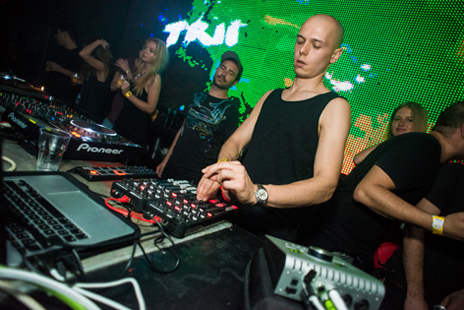 Come Sunday, it was time for the biggest and most famous opening of all: Space. Split across the venue's five rooms, plus the outdoor Flight Club, the party traditionally has more of a festival feel to it. Topping the bill this year were Deep Dish, who most of the crowd were keen to check out, if only out of some mixture of nostalgia and curiosity. Playing last at the Flight Club, the duo took to rolling out slice after slice of greyscale tech house, sounding less like the groovy Deep Dish of old and more like a untidy combination of Dubfire and Sharam's contemporary styles. Considering the former trades in blistering minimal techno, while the other makes big-room house, you can imagine why it didn't work. It's a shame such a grand, sweet-sounding stage wasn't put to better use.
Inside, South London Ordnance was busy taking it to the Terrazza. Playing tougher than his productions might otherwise suggest, the UK DJ mixed well, occasionally switching up the rhythms so as to inject the dancefloor with a dose of percussive, Caribbean swing. For his last track, though, he kept it dark and rolling, dropping Nina Kraviz & Luke Hess' Rekids hit "Remember." Elsewhere, Paul Reynolds was keeping the vibe upbeat in El Salon, while later The Chemical Brothers returned to the Discoteca for the second year running with their brand of blistering acid-tinged techno. For a party of its size and stature, and considering the breadth of top-class music on offer across the season, it's hard not to feel that the opening was a slightly limp reflection of Space's market-leading reputation.
Come Sunday, it was time for the biggest and most famous opening of all: Space. Split across the venue's five rooms, plus the outdoor Flight Club, the party traditionally has more of a festival feel to it. Topping the bill this year were Deep Dish, who most of the crowd were keen to check out, if only out of some mixture of nostalgia and curiosity. Playing last at the Flight Club, the duo took to rolling out slice after slice of greyscale tech house, sounding less like the groovy Deep Dish of old and more like a untidy combination of Dubfire and Sharam's contemporary styles. Considering the former trades in blistering minimal techno, while the other makes big-room house, you can imagine why it didn't work. It's a shame such a grand, sweet-sounding stage wasn't put to better use.
Inside, South London Ordnance was busy taking it to the Terrazza. Playing tougher than his productions might otherwise suggest, the UK DJ mixed well, occasionally switching up the rhythms so as to inject the dancefloor with a dose of percussive, Caribbean swing. For his last track, though, he kept it dark and rolling, dropping Nina Kraviz & Luke Hess' Rekids hit "Remember." Elsewhere, Paul Reynolds was keeping the vibe upbeat in El Salon, while later The Chemical Brothers returned to the Discoteca for the second year running with their brand of blistering acid-tinged techno. For a party of its size and stature, and considering the breadth of top-class music on offer across the season, it's hard not to feel that the opening was a slightly limp reflection of Space's market-leading reputation.
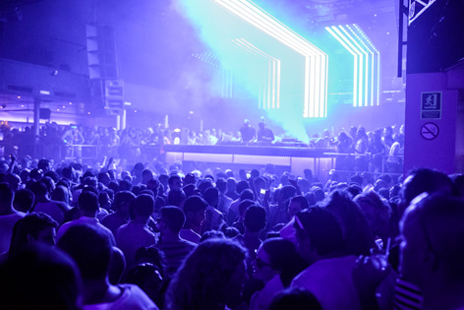 At first glance, the lineup for the Circoloco opening also looked a little less star-studded than usual. But with three rooms hosting more than 25 DJs, you were never likely to run out of options. Spinning early in the Terrace, Richy Ahmed wasted no time with pleasantries, skipping straight to the thick-edged house sound he's rapidly made his own. You can imagine just how boisterous Levon Vincent's "Man Or Mistress" sounded on that Loud Professional rig. Outside in the crisp evening air, Apollonia were busy rolling out groove after groove, starting thick and housey before moving into slightly dreamier, more musical pastures. It's hard to think of anyone better suited to that open-air, sunset slot.
Back inside the Terrace it was time for Black Coffee. Returning after his debut in August last year, the South African star produced an early candidate for set of the season. Leading from the off with slices of piercing house, he never let the energy dip, fusing sweet, soaring vocals with layer upon layer of funk and percussive flair. At times it felt trancey, maybe even slightly over the top, but the crowd still offered their thundering approval. Even Kerri Chandler, one of the South African's musical heroes, paled in comparison later on. Chez Damier, booked to play the penultimate set in the Main Room, proved more charismatic, treating the crowd to Stevie Wonder remixes ("As") amidst a conveyer belt of throbbing Chicago house.
At first glance, the lineup for the Circoloco opening also looked a little less star-studded than usual. But with three rooms hosting more than 25 DJs, you were never likely to run out of options. Spinning early in the Terrace, Richy Ahmed wasted no time with pleasantries, skipping straight to the thick-edged house sound he's rapidly made his own. You can imagine just how boisterous Levon Vincent's "Man Or Mistress" sounded on that Loud Professional rig. Outside in the crisp evening air, Apollonia were busy rolling out groove after groove, starting thick and housey before moving into slightly dreamier, more musical pastures. It's hard to think of anyone better suited to that open-air, sunset slot.
Back inside the Terrace it was time for Black Coffee. Returning after his debut in August last year, the South African star produced an early candidate for set of the season. Leading from the off with slices of piercing house, he never let the energy dip, fusing sweet, soaring vocals with layer upon layer of funk and percussive flair. At times it felt trancey, maybe even slightly over the top, but the crowd still offered their thundering approval. Even Kerri Chandler, one of the South African's musical heroes, paled in comparison later on. Chez Damier, booked to play the penultimate set in the Main Room, proved more charismatic, treating the crowd to Stevie Wonder remixes ("As") amidst a conveyer belt of throbbing Chicago house.
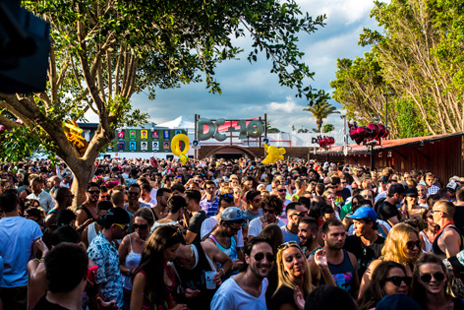 A long lie-in later and it was time for Tuesday's extended double-header: Rumors and Fuse. Held at Plan Be, Guy Gerber's daytime residency is looking to stake its claim as the official Monday night roll-through. Considering its leafy decorations, colourful crowd and ripe sound system, there's little to suggest it won't succeed. Or at least that's what I thought. Around 9 PM the music stopped completely, followed shortly after by a team of local police officers. With the venue situated in an industrial estate, it's hard to know what, or who, caused it. Fuse, over at Sankeys, were to have no such issues. Packed almost from the word go, The Basement stayed full all night, with Rossko's back-to-back set with Julian Perez leaving a particularly lasting impression. With a fuller schedule than ever before, it's looking like the extension could pay off for the East London lot.
Photo credit:
Tasya Menaker
A long lie-in later and it was time for Tuesday's extended double-header: Rumors and Fuse. Held at Plan Be, Guy Gerber's daytime residency is looking to stake its claim as the official Monday night roll-through. Considering its leafy decorations, colourful crowd and ripe sound system, there's little to suggest it won't succeed. Or at least that's what I thought. Around 9 PM the music stopped completely, followed shortly after by a team of local police officers. With the venue situated in an industrial estate, it's hard to know what, or who, caused it. Fuse, over at Sankeys, were to have no such issues. Packed almost from the word go, The Basement stayed full all night, with Rossko's back-to-back set with Julian Perez leaving a particularly lasting impression. With a fuller schedule than ever before, it's looking like the extension could pay off for the East London lot.
Photo credit:
Tasya Menaker